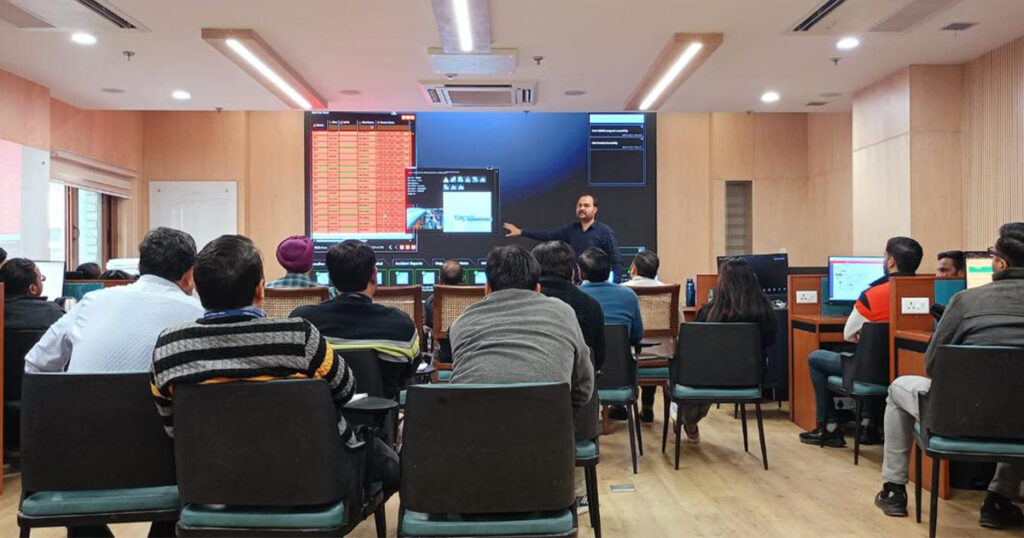Large-scale events like festivals, sports tournaments, and religious gatherings bring together thousands, sometimes millions, of people. While these events celebrate culture, sportsmanship, or spirituality, they pose significant challenges in ensuring safety and efficient crowd management. In this scenario, centralized event monitoring through Integrated Command and Control Centers (ICCC) is pivotal. These advanced hubs leverage smart crowd control systems to maintain order, prevent chaos, and respond swiftly to emergencies.
The Role of ICCCs in Modern Crowd Management
As the scale of events grows, traditional crowd management techniques struggle to keep pace. This is where ICCCs serve as the nerve centre for real-time monitoring and decision-making. These centralized hubs integrate data from various sources, such as surveillance cameras, IoT sensors, and social media platforms, to provide a comprehensive event overview.
For example, during Mahakumbh 2025, one of the world’s largest religious gatherings, an ICCC was established to monitor and manage the movement of millions of attendees. With thousands of surveillance cameras feeding into the command centre, authorities could track crowd density, identify bottlenecks, and address security concerns in real time.
How Centralized Event Monitoring Enhances Safety
Centralized event monitoring enables organizers to maintain a bird’s-eye view of the event, ensuring every corner of the venue is under surveillance. This approach has several benefits:
1. Real-Time Data Analysis
ICCCs employ smart crowd control systems that process data instantly, allowing immediate response to irregularities. If a crowd forms in an unexpected area, the system can alert officials to deploy resources and manage the situation.
2. Efficient Resource Allocation
By consolidating all data in one place, ICCCs allow event managers to allocate resources more effectively. Security personnel can be deployed to high-risk zones, ensuring optimal safety without overextending manpower.
3. Proactive Risk Management
With predictive analytics, ICCCs can foresee potential issues before they escalate. For instance, AI-powered systems can detect overcrowding and suggest alternate routes or barriers to redirect attendees.
The Role of Smart Crowd Control Systems in ICCCs
At the heart of an effective ICCC lies a smart crowd control system. These systems integrate artificial intelligence, machine learning, and IoT to provide actionable insights. Here’s how they contribute to event security:
1. Automated Alerts
Smart systems can identify unusual patterns, such as a surge in crowd density or unauthorized access to restricted areas. Automated alerts notify operators immediately, enabling quick intervention.
2. Predictive Crowd Flow Management
These systems use historical data and real-time inputs to predict crowd movements and suggest adjustments to prevent bottlenecks. For example, at sporting events, they can guide attendees to the least congested exits.
3. Facial Recognition and Identification
Advanced ICCCs can integrate facial recognition technology to monitor individuals in the crowd. This feature is invaluable in identifying known threats or lost individuals during large gatherings.
Case Study: Integrated Command Centers at Mahakumbh 2025
The Mahakumbh 2025, held in Prayagraj, India, is a prime example of how ICCCs revolutionize crowd management. Ensuring safety was a monumental task, with over 200 million attendees expected during the event. Authorities established a state-of-the-art ICCC with AI-powered cameras, IoT sensors, and communication systems.
1. Centralized Event Monitoring
The ICCC monitored over 3,000 cameras across the venue, providing a live feed of crowd movements. Officials could track everything from traffic flow to security breaches with a unified dashboard.
2. Smart Crowd Control Systems in Action
IoT-enabled sensors tracked crowd density in real-time, enabling proactive measures like rerouting foot traffic or deploying additional personnel to busy areas. These measures significantly reduced the risk of overcrowding and stampedes.
3. Emergency Response Management
- During an unforeseen incidentthe ICCC’s quick response system enabled Coordination with on-ground teams to manage the situation within minutes. This efficiency level would have been impossible without the centralized monitoring capabilities of the ICCC.
Key Benefits of ICCCs for Event Security
The Mahakumbh case study underscores the broader benefits of ICCCs for managing crowds at large events:
1. Enhanced Situational Awareness
ICCCs provide a centralized platform for monitoring every aspect of the event, ensuring no blind spots in security coverage.
2. Faster Decision-Making
With real-time insights and predictive analytics, ICCCs empower event managers to make informed decisions quickly.
3. Scalable Solutions
ICCCs can adapt to events of varying scales, from local concerts to global summits, making them a versatile solution for crowd management.
4. Improved Attendee Experience
By ensuring smooth crowd flow and addressing issues promptly, ICCCs enhance the overall experience for attendees.
Challenges and the Future of ICCCs
While ICCCs offer numerous advantages, implementing them comes with challenges. High setup costs, the need for skilled personnel, and data privacy concerns are some of the hurdles that event organizers must address. However, as technology evolves, these challenges are becoming more manageable.
The future of ICCCs lies in deeper integration with emerging technologies like 5G, augmented reality (AR), and blockchain. For instance, 5G connectivity can ensure faster data transmission, while AR can provide on-ground teams with enhanced situational awareness through smart glasses.
Conclusion: A New Era of Event Security
Integrated Command and Control Centers represent a paradigm shift in crowd management and event security. By combining centralized event monitoring with smart crowd control systems, ICCCs enable proactive risk management and efficient resource allocation, ensuring attendees’ safety and events’ success.
The success of ICCCs in managing massive gatherings like the Mahakumbh 2025 demonstrates their potential to redefine how we approach event security. As technology advances, ICCCs will play an increasingly critical role in ensuring that large-scale events are safe and enjoyable for everyone involved.



